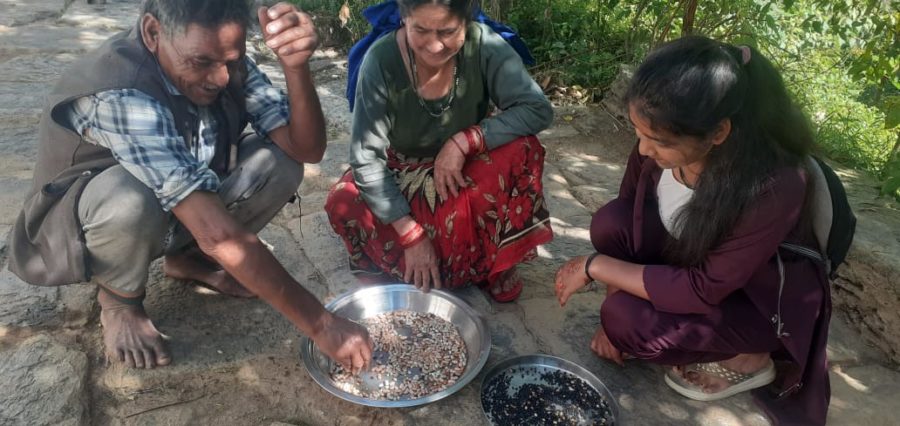
By Dr Vandana Shiva, 27 October 2022
The web of life is a food web, and we are interconnected with natural systems and all living things. Thus, food sovereignty is primarily an ecological process of co-creation with other life forms. Food sovereignty begins with the right of all living things, of biodiversity and “living” seeds to thrive and evolve, with the right of soil and food not to be considered inert matter. Earth rights are the foundation of the right to food freedom and food sovereignty. There can be no food sovereignty without seed sovereignty, that is, the right to save and use traditional, resilient, native seeds. This activity necessarily involves caring for the land and soil. We cannot aspire to food sovereignty if we do not nurture soil organisms because ecosystem biodiversity supports biodiversity within our gut microbiome. The health of the planet and our health are one and the same.
Seed sovereignty means seeds in the hands of farmers. Seeds that can be stored, bred and exchanged freely. Open-pollinated seeds that are not patented, genetically modified, owned or controlled by agribusiness giants. Seed sovereignty is based on reclaiming seeds and biodiversity as commons and public goods. When the food web is broken by chemicals and poisons and the rules of “free trade” and globalization, biodiversity is wiped out, farmers go into debt, and people die from starvation or chronic non-communicable diseases related to environmental pollution and poor quality food. Food sovereignty includes the right to grow food free of chemicals and GMOs. Food sovereignty means poison-free food and agriculture.
In 1987 I was invited to a meeting on biotechnology from which it became clear how the opportunity to patent life forms for profit was the real purpose of pushing GMOs onto the market. It was then that I decided to start saving seeds through the movement that, since 1991, has been called Navdanya. Since then, more than 150 community seed banks have been established in India. Local seeds, adapted to local cultures, provide more nutrition and are more resilient to climate change. At the Navdanya Farm and Earth University, we have trained more than one million farmers who now practice organic agriculture based on biodiversity and without the use of synthetic chemicals.
The shift from globalization driven by multinational corporations to a progressive localization of our economies has become an ecological and social imperative, essential for food sovereignty. Supporting local economies implies that anything produced locally, by making use of local resources, should be protected, so as to protect both people’s lives and the environment. Food sovereignty therefore means biodiverse, circular and local food systems.
The globalized industrial food system has recently produced a new monster, the modern synthetic, fake, lab-made food industry, even claiming that fake food is the best solution for the health of the planet and people. It is important to consider that artificial food depends on industrial agriculture. For example, on soy monocultures with high chemical input of fertilizers and pesticides and, in some cases, on GMO soy. Food sovereignty means feeding ourselves real, genuine, biodiverse food and freeing ourselves from the false promises of artificial food.
Therefore, free trade rules written by corporations that promote hunger, disease and climate change must be corrected. Earth rights and human rights are the foundation of food freedom and food sovereignty. Around the world, small farmers are already implementing organic farming based on biodiversity, and real food free of chemicals. They are practicing agroecology, preserving and nurturing their soils and seeds. They are feeding their communities with healthy, nutritious food while regenerating the soil and the planet. True agriculture is practiced in harmony with the laws of nature and leads to the regeneration of the planet through the renewal of biodiversity, soils, and water. We need to support small farms that care for the earth, for all life, and produce biodiverse, healthy, fresh, environmentally friendly food for all.
